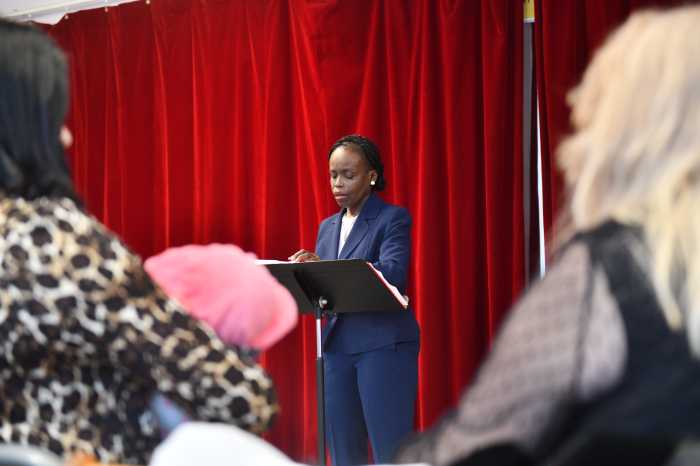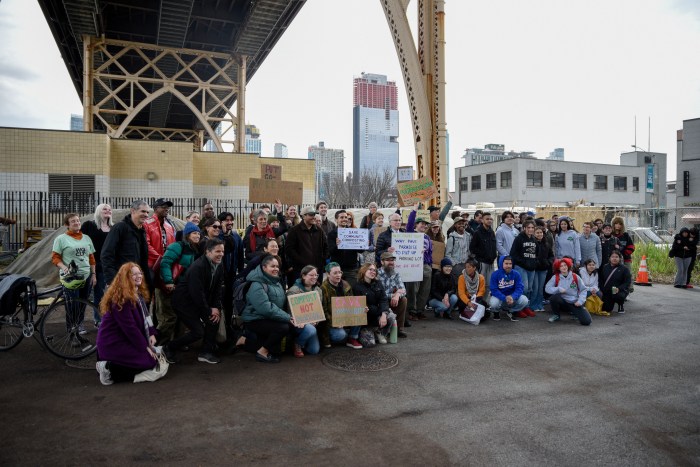
Local students, elected officials and environmental activists gathered at Big Reuse’s community composting site in Queenbridge to fight for it to remain. (Photo by Iryna Shkurhan)
Apr. 24, 2024 By Iryna Shkurhan
Elected officials and environmental advocates rallied on the grounds of a nationally recognized community composting site in Long Island City on Friday to prevent the NYC Parks Department from evicting the non-profit organization that operates it.
The Long Island City composting site underneath the 59th Street Bridge in Queensbridge is one of two operated by Big Reuse, which distributes compost back to the city’s parks, community gardens, and schools. Big Reuse has produced over 3 million pounds of compost through partnerships with 75 community drop-off sites since it landed in Queens. But come June 30, Big Reuse will be required to vacate its Queensbridge site as its lease will expire.
Despite the support of local elected officials, Queens community boards 1 and 2, environmental nonprofits and thousands of local residents who signed a petition, the Parks Dept. is not budging. The department says that it needs the site in order to reconstruct Baby Queensbridge Park, which sits adjacent to Big Reuse’s composting site.
To facilitate the park project, which is more than halfway through the procurement stage, the department says it will need the compost site to be vacant in order to store construction materials and for Parks Dept. staff to park their private vehicles. Construction is scheduled to begin this fall and last 12-18 months.
But Big Reuse argues that the composting site can still operate without disrupting the park’s reconstruction. The operators hope to find a compromise with the Parks Dept. to keep their site running during and after the revitalization process.
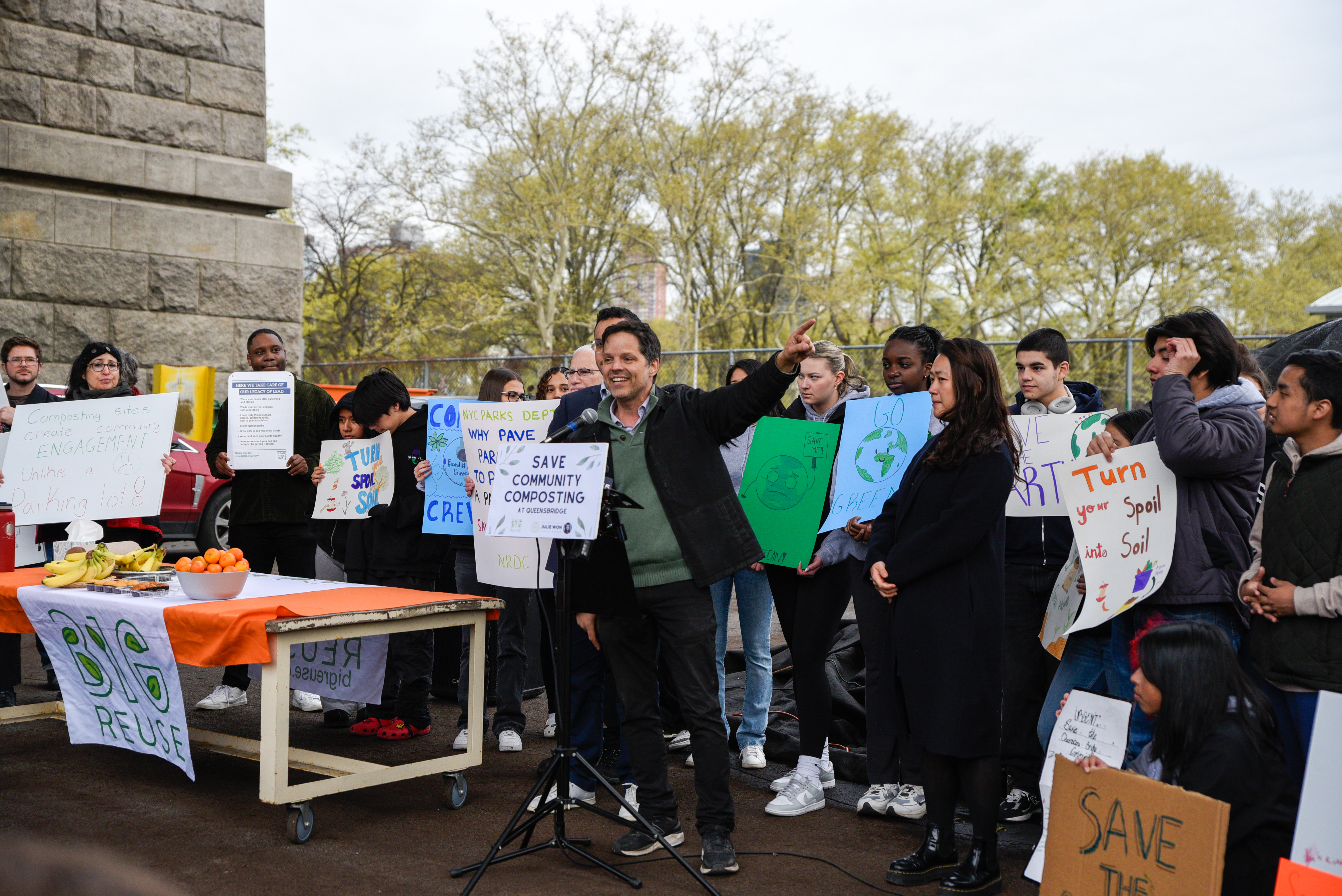
The founder of the Big Reuse, Justin Green, rallied to keep the community composting site alive.Photo by Iryna Shkurhan
During the Friday rally, dozens of local high school students armed with handmade signs stood behind Big Reuse and elected officials as they demanded that the city find a solution.
“If we’re truly moving towards a greener city, as the mayor is saying, the Parks Dept. as well as the DSNY, have to work together to salvage this site,” said Council Member Julie Won, who represents the area. “And if we need to start sleeping here, if we need to start camping here to protect it, then we will.”
According to Big Reuse’s leaders, the Parks Dept. has failed to come to the table to discuss mutually beneficial solutions. The organization says that the city has adopted the approach that the land belongs to them and that they are free to use it as they see fit.
“We haven’t gotten any effort to cooperate,” said Justin Green, Executive Director and Founder of Big Reuse. “We asked them [Parks Dept. officials ] to come out multiple times. They’re like – ‘No, it’s our space, we can do what we want with it. You have no say.’”
The elected officials collectively expressed disappointment in the Parks Dept. and noted that collaboration with the Sanitation Dept., which runs compositing initiatives, is needed.
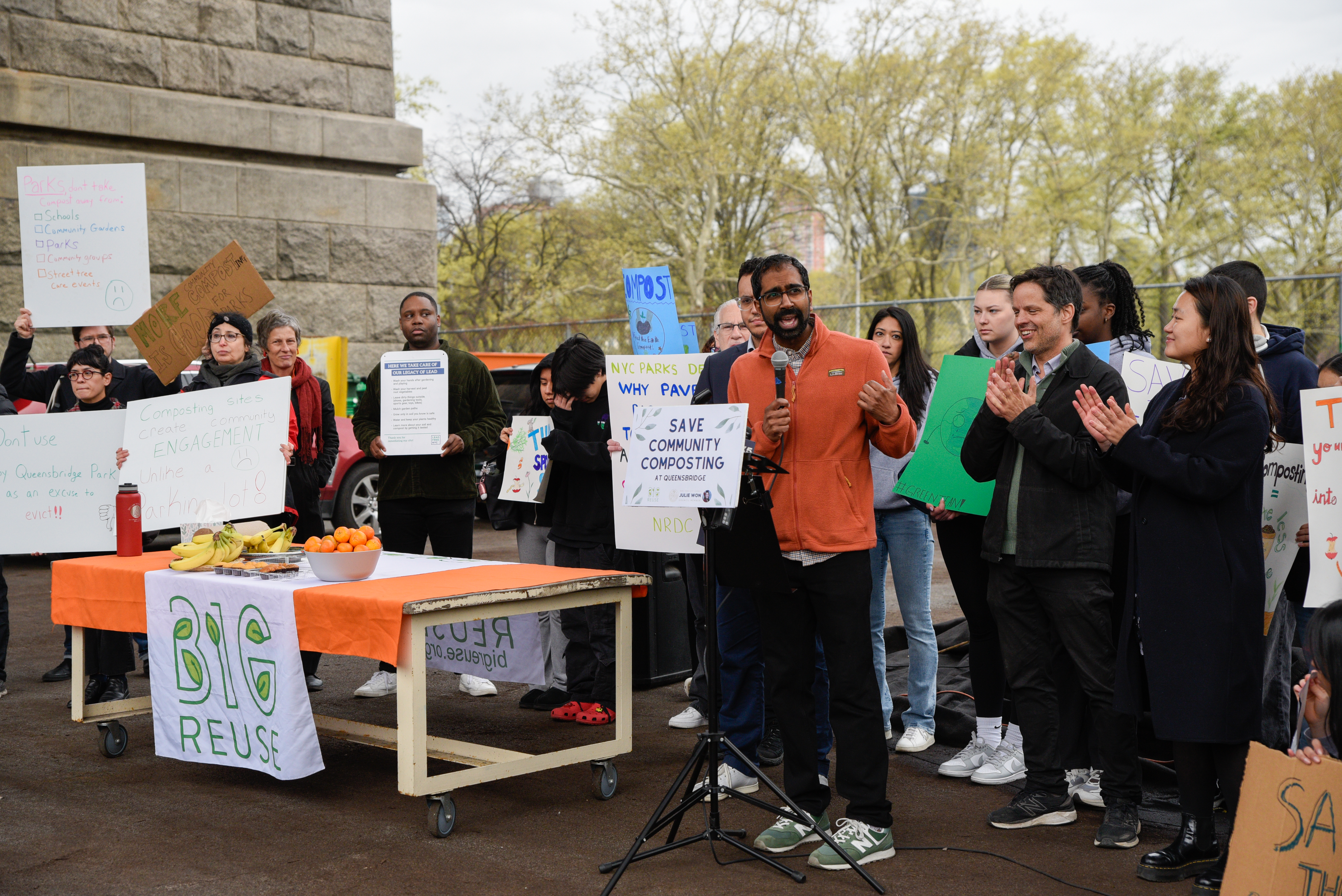
Jackson Heights City Council Member Shekar Krishnan joined fellow Council Member Julie Won, who represents Long Island City, to stand with Big Reuse.Photo by Iryna Shkurhan
“What really frustrates me is that right now, both Parks and Sanitation are unable or unwilling to figure out a way to make sure Big Reuse’s home stays,” said Council Member Shaker Krishnan, who represents Jackson Heights, at the turnout on Friday.
Krishnan, who is also the Chair of the Council’s Committee on Parks and Recreation, had a message to the commissioners of both departments: “Figure it out.”
“If we can’t get this right, then I don’t have any faith that this administration will be able to get community composting right across our city,” added Krishnan.
Council Member Shaun Abreu, who represents Upper Manhattan and chairs the sanitation committee, traveled to Queens to support the cause with his fellow council members.
“I don’t buy the argument that you can’t have parks and community composting right next to each other,” said Abreu. “The fact that this needs to be used for parking space, it makes no sense.”
In order to complete the reconstruction of Baby Queensbridge Park, the Parks Dept. says it needs additional space to store shipping containers with construction materials and room for staff to park. Big Reuse said it could make room on its existing lot for some supplies and proposes an adjacent lot for parking and storage. The non-profit proposes the Parks Dept. use a 22,000-square-foot parking lot, steps away, for its vehicular needs instead of its site.
“Staff parking for parks employees driving their private cars to work should not be the priority; climate should be the priority,” Green told QNS.
A representative from the Parks Dept. said that despite calls to let Big Reuse carry on community compositing at the Queensbridge site, it is sticking with the terms of the lease and is looking forward to the redevelopment of the park.
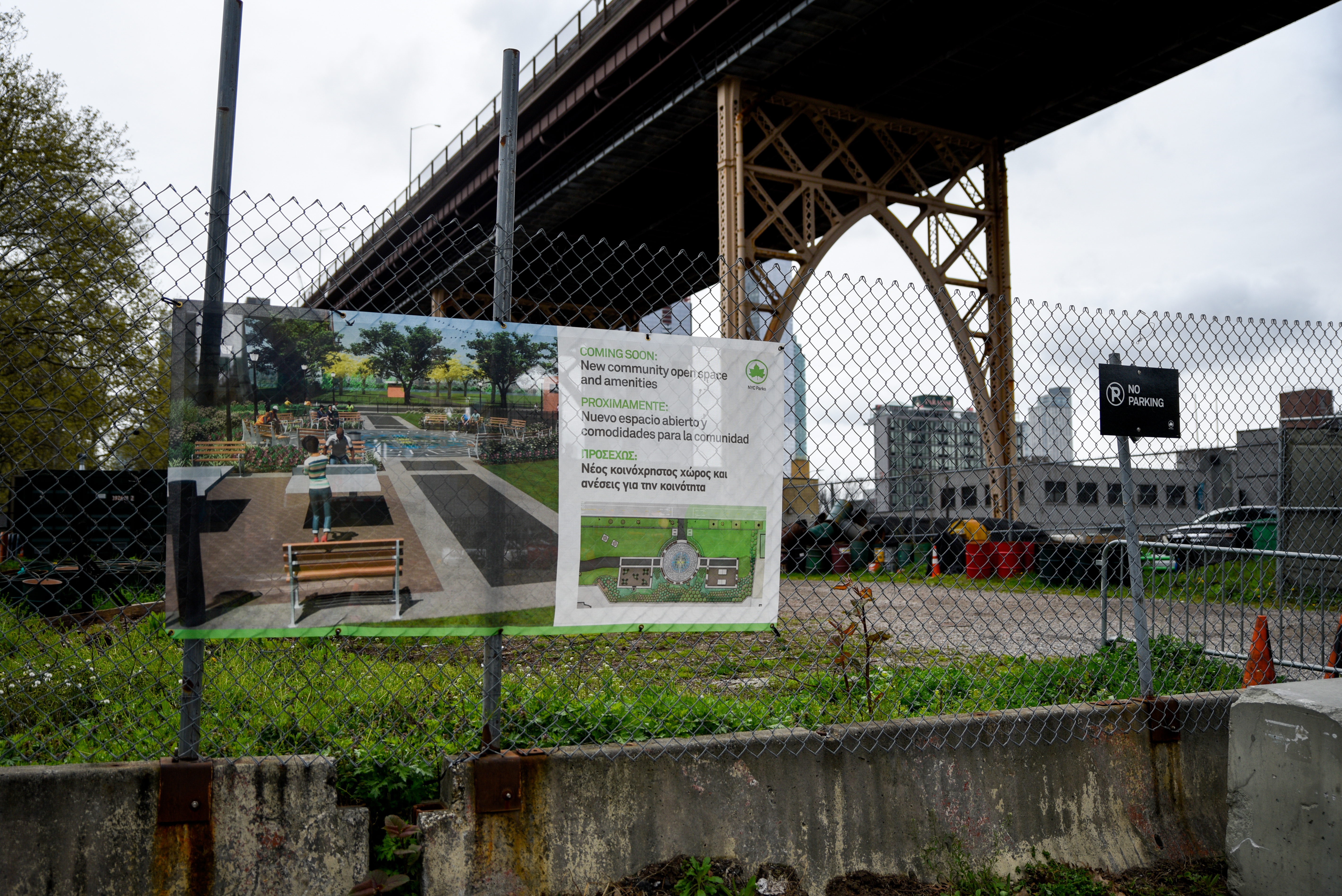
The reconstruction of Baby Queensbridge Park is scheduled to begin this fall.
“In accordance with our license agreement, Parks will continue to provide a free space for Big Reuse to use through June. We will then begin construction on our capital project in the fall, which will revitalize the park and provide more recreational amenities, increased access to greenways, and improved public spaces,” the spokesperson said in a statement to QNS. “While we support composting and recognize the important work Big Reuse does, we look forward to executing our vision for this space to enhance the neighborhood’s quality of life, including the nearby NYCHA complex.”
A representative from Fridays for Future NYC, a youth-run climate organization inspired by Greta Thunberg that aims to raise climate awareness, pointed out that community composting is one of the most economical, ecological and ethical ways to process waste. Representatives in attendance for City Comptroller Brad Lander and U.S. Rep. Nydia Velazquez expressed similar sentiments in their rallying remarks.
“Community composting is a win win win win win, there is no downside,” said Clare Miflin, Executive Director for Center of Zero Waste Design. “I can’t think of any better way to tackle the overlapping crises we have from climate chaos to a disconnection from nature to mental health issues.”
On the day of the rally, Gil Lopez, who coordinates education and events at the site, led the students in attendance on a tour of the facility and explained the process of community composting and its larger environmental benefits. He also later showed visitors street tree care practices, another Big Reuse initiative that revitalizes dry and contaminated soil around the city’s sidewalk trees with fresh compost.
Big Reuse also says that its composting method, using aerated piles with heavy-duty covers, is more effective than the city’s version of “composting” in Greenpoint. Currently, food waste picked up curbside from residences in Queens is processed with sewage sludge that includes PFAS, also known as forever chemicals. While it does reduce the waste that ends up in landfills, the overly processed result does not have the same environmental benefits as smaller-scale community composting.
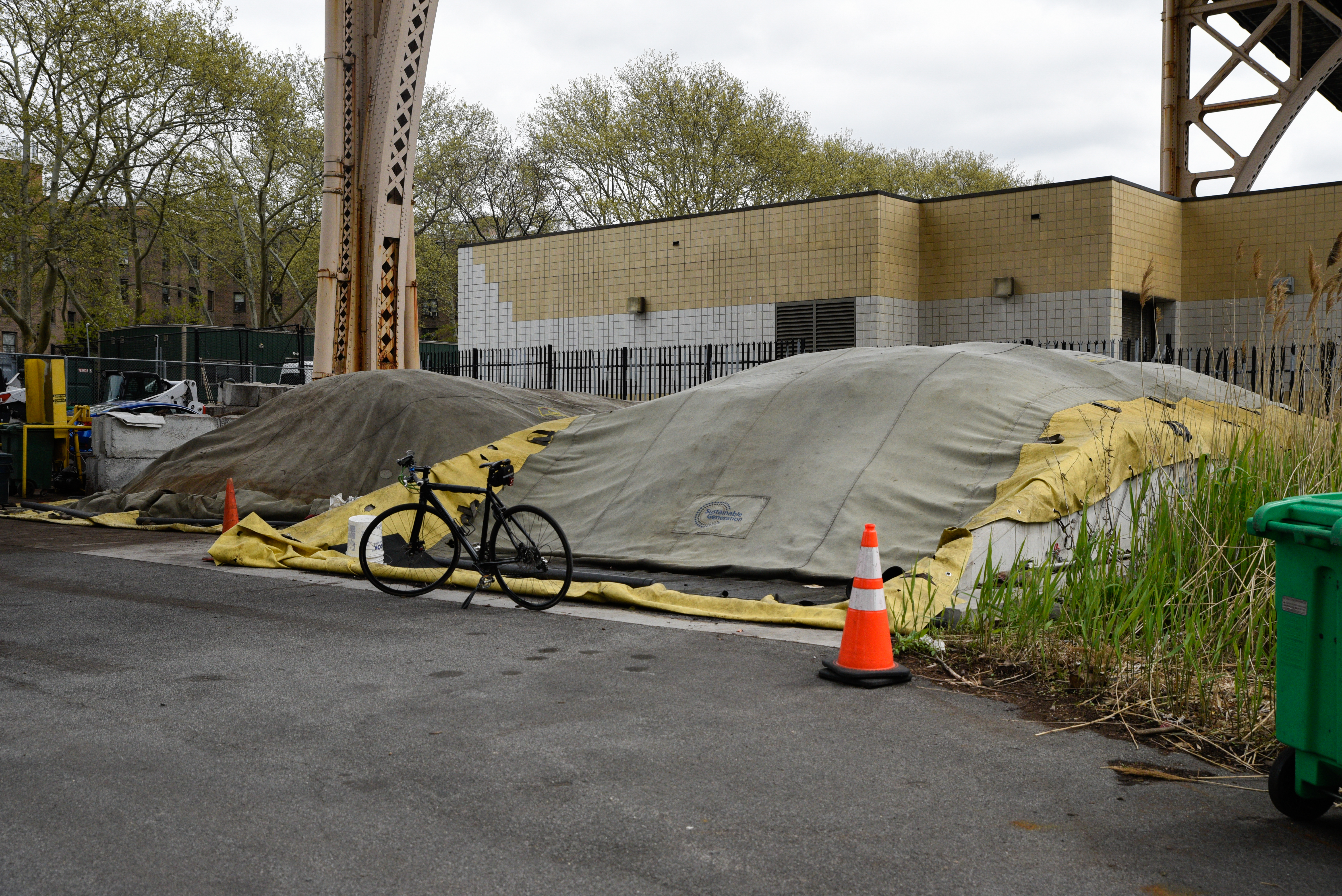
Big Reuse composts with aerated static piles that are covered with heavy duty covers.Photo by Iryna Shkurhan
“We believe that we can meet Park’s needs, and meet the needs of Big Reuse and the NYC Compost Project harmoniously, so that we have a win win win situation,” Lopez told QNS. “We’re already accomplishing the goals and the purpose the Community Parks Initiative wants to accomplish. We can exist here in really nice symbiosis with that new park.”
He noted that coordinating the site with the Parks Dept. has been an informal struggle since day one, despite compost from its Queensbridge site ending up in parks across the city. However, as the city moved towards the curbside composting model and away from the community composting way at Big Reuse, Lopez claimed the apathy from Parks Dept. officials increased.
A leading environmental advocacy attorney at the rally noted that composting experts like Lopez are crucial to meeting environmental goals.
“We all appreciate what the council has done to mandate curbside organics collection. But curbside organics collection will never work unless we have community composters teaching New Yorkers, educating students, training business people on why it’s important to compost and how to compost,” said Eric Goldstein, NYC Environmental Director at Natural Resources Defense Council.
Ahead of his remarks he played “Big Yellow Taxi” by Joni Mitchell where she sings, “they paved paradise and put up a parking lot” in a criticism of new development at the cost of nature.
“More than 54 years later, and it still seems like some city officials in the Parks Department and City Hall haven’t gotten the message,” Goldstein added. “We don’t know who’s making decisions in City Hall. But we do know there’s time to turn this issue around and save this site for Big Reuse.”






